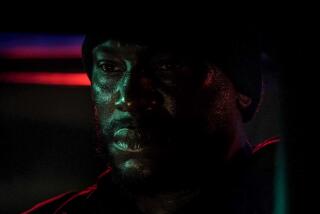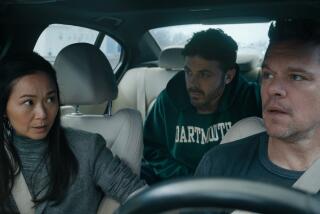Movie review: ‘Brighton Rock’
“Brighton Rock” is beautiful and visually accomplished yet numbingly bleak and ultimately unpleasant and unexciting.
A certain sordidness is inevitable given the seedy ambience of the celebrated Graham Greene novel (on which the movie is based) about the rise and fall of a British boy gangster prone to the worst kind of ruthless behavior. But history tells us this film’s air of sluggish, heavy going could have been avoided.
Originally published in 1938, “Brighton Rock” has been filmed once before, in 1947. That version became an instant sensation because of the galvanizing, all-sinister-all-the-time performance of Richard Attenborough (the future director of “Gandhi,” of all things) as a psychotic gang leader with the improbable name of Pinkie Brown.
Rowan Joffe, in his first feature as both writer and director, has done several interesting things with the Greene material, including updating the story to 1964, a time when Britain’s competing Mod and Rocker youth cultures violently took their differences to the streets.
Strikingly shot by cinematographer John Mathieson, a frequent Ridley Scott collaborator, “Brighton Rock” is rich in film noir atmosphere and visual flair. With Brighton unavailable, the production was fortunate to find the perfect period pier at nearby Eastbourne, but the setting turns out to have more intrinsic interest than the story.
For neither Joffe’s direction nor Sam Riley’s tepid performance as Pinkie has been able to give this version what Attenborough’s dynamism gave the original: an infusion of energy that was no less compelling for being completely evil.
Riley, who played Joy Division frontman Ian Curtis in “Control,” is a cold-eyed actor in the Robert Pattinson mold: Being removed is his default position, and having him as a protagonist makes an unfortunate lugubriousness inevitable.
The film doesn’t help matters by introducing Pinkie as a timid underling in his Brighton gang, a weaker, ambivalent character who comes off as more dithering and doomed than the dynamic lord of crime he eventually schemes to be.
Pinkie gets his chance at unexpected advancement when, in the scene that opens the film, his boss, Kite, is slain by a rival gang. Pinkie and his confreres, led by Spicer (Phil Davis), plot revenge against the killer, a thug named Hale (Sean Harris). Hale tries to delay his fate by conversing with an old friend, brassy cafe owner Ida Arnold (Helen Mirren), but to no avail.
Hale is so desperate he even tries to chat up a total stranger on the pier, an innocent young woman named Rose (Andrea Risenborough) who works at Ida’s cafe. When circumstances make Rose a potentially incriminating witness, Pinkie gets the job of romancing her to keep her quiet.
Despite this haphazard start, the Pinkie-Rose relationship soon becomes the film’s focus, and it is a problematic one. Nearsighted, awkward and timid as only someone who lives with an ogre of a father can be, Rose does come to display a will of her own, but she and Pinkie are such unlikely, tormented folks, both individually and as a couple, that it is difficult to spend time in their presence.
The one thing these two have in common is their religion; they are both Catholics, or as Pinkie puts it, “Romans.” Catholicism was a major preoccupation for Greene, but Pinkie is hardly your garden-variety churchgoer. He believes passionately not in heaven but in the flames and torments of eternal damnation, and he loves to mock Rose’s initially conventional beliefs.
Filled with unsavory people and melancholy events, “Brighton Rock” chooses to play out its tale in a deliberate way. It has some strong actors, including a skillful Mirren, the always interesting John Hurt as her pal, and a rare non-CGI performance by Andy Serkis as a rival mobster, but it is too lifeless too often for its own good. It won’t make you forget the 1947 film, and if you haven’t seen that classic, you’ll never understand how this kind of a story could have the reputation it does.
More to Read
The biggest entertainment stories
Get our big stories about Hollywood, film, television, music, arts, culture and more right in your inbox as soon as they publish.
You may occasionally receive promotional content from the Los Angeles Times.











